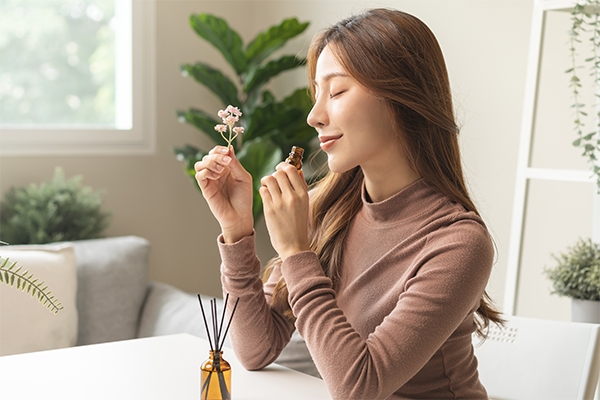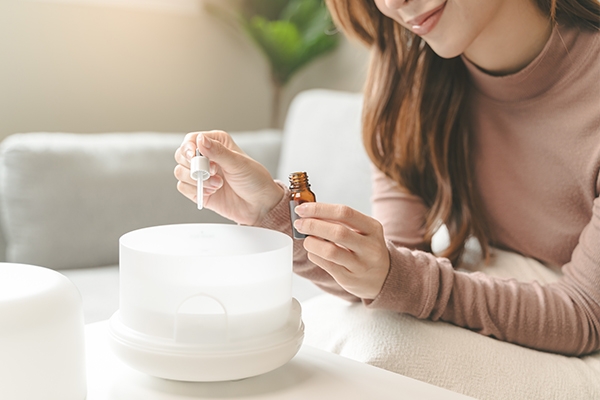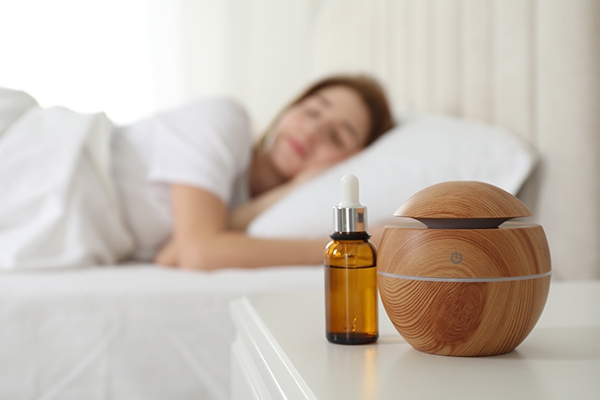Does Aromatherapy Improve Our Health?

It's been a long day. You got up early, drove to work in crazy traffic, got stressed, faced many boss "requests" that had to be handled quickly, got frustrated again, and drove home in even more terrible traffic. When you arrived home, the aroma of rose geranium greeted you. Like magic, it makes you feel calm and tranquil. Your burden appears to have vanished. What exactly is going on?
Essential oils, depending on their kind, have the potential to affect mood. When you inhale the oil, the scent molecules move through the olfactory system—the nose and nasal passages—and then into the limbic system, which controls emotions in the brain.
Essential oils are known to offer numerous health advantages. From headaches, stomachaches, and toothaches to hair growth. However, are essential oils truly beneficial to one's health?
Aromatherapy essential oils are derived from various parts of plants and then distilled. Since 6,000 years ago, this oil has been utilized in a variety of traditional treatments for various diseases to improve one's mental and physical well-being.
Ancient cultures in China, India, Egypt, and many other places utilized many aromatic plants as resins, balms, and oils. Aside from being a natural treatment, essential oils were also used for religious purposes during that time.
How do we use it?

Essential oils are claimed to provide natural treatments for a variety of diseases. However, there is no evidence that they are beneficial to one's health.
Laboratory tests at Johns Hopkins found that certain essential oils were more effective than antibiotics at killing Lyme bacteria. However, the findings of this test varied from person to person.
Although essential oils may be ineffective for some users, others have discovered that they can help with anxiety, sadness, nausea, sleeplessness, increasing appetite, and treating dry mouth. However, keep in mind that this natural product contains chemicals, so use it with caution.
Many essential oils have been proven safe when used as indicated.
Essential oils can be utilized directly by breathing them or indirectly by massaging, applying lotion, or swimming with them.
Citrus oils such as bergamot, lemon, lime, and angelica can trigger allergic responses, skin irritation, and sun sensitivity in certain people. If you are allergic to this oil, avoid direct sunlight while using it.
Furthermore, more research is needed to evaluate the effect of essential oils on children and pregnant or breastfeeding women and how these oils interact with medicines and other treatments.
Some people with chronic conditions, such as high blood pressure, should avoid essential oils like rosemary and spike lavender. People who have breast or ovarian cancer should avoid using oils containing estrogen-like chemicals, such as fennel, anise, sage, and clary sage.
Read more: What Women Should Know About Ovarian Cancer.
10 essential oil benefits

Aromatherapy cannot substitute for basic medical treatment. Yet evidence shows that aromatherapy can have health benefits in certain cases.
1. Reduce stress
Stress is an inevitable aspect of life, and it affects everyone differently. While it is nearly impossible to avoid it, there are ways to handle it.
Stress relief essential oils include lavender, lemongrass, geranium, jasmine, and chamomile. This sort of aromatherapy relaxes the neurological system, decreases blood pressure and pulse rate, and modulates brain waves.
2. Reduces anxiety
According to data from the Indonesian Ministry of Health in 2020, up to 18,373 people had anxiety disorders, over 23,000 had depression, and over 1,193 attempted suicide.
As a result, many people are seeking natural therapies, and essential oils such as rose, lavender, bergamot, and chamomile are on the rise.
3. Boost your energy
Do you notice your vitality dwindling by 15:00? At that hour, you typically drink coffee to refuel. Instead of continuing to drink caffeine, try something more natural to restore your energy. Lemon essential oil contains naturally energizing terpene antioxidants such as limonene.
Peppermint oil can also aid with concentration and weariness.
4. Improve your focus
Do you find it difficult to concentrate on anything? The essential oils of rosemary, basil (Ocimum basilicum), and sage can help improve focus, memory, and cognitive ability.
Antioxidants included in essential oils help fight free radicals. Aromatherapy can help those with Alzheimer's disease, dementia, and other mental illnesses.
5. Reducing physical pain
Aromatherapy has been shown to reduce pain, particularly pain associated with gynecological cancer, post-surgery, and childbirth. Essential oils such as eucalyptus, chamomile, thyme, and ginger can be used to ease pain.
6. Improve your sleep quality
Lavender oil has been shown in studies to improve sleep quality. Chamomile, ylang-ylang, and bergamot are other essential oils with similar properties.
7. Aids digestion
Ginger, peppermint, fennel, and juniper berry essential oils can help with upset stomachs, diarrhea, and indigestion. These natural substances activate digestive enzymes, which aid in nutrient breakdown.
8. Boost your immune system
Oregano essential oil is excellent for combating infections due to its anti-inflammatory properties. This oil can help protect the body against bacterial infections.
Other than oregano, the finest essential oils for immune system support are ginger, myrrh, eucalyptus, and frankincense.
9. Hormone balancing
Are you dealing with PCOS (polycystic ovarian syndrome) or infertility? Essential oils like rose and geranium have been scientifically shown to aid women who have estrogen issues.
According to a study published in Neuro Endocrinology Letters, essential oils can impact estrogen and assist women in experiencing the symptoms of menopause as well as lower estrogen levels.
10. Improve hair health
Do you want thicker and stronger hair? Are you suffering from dandruff or a dry scalp? Essential oils are utilized as safe hair treatments to boost hair health and reduce the use of chemicals.



